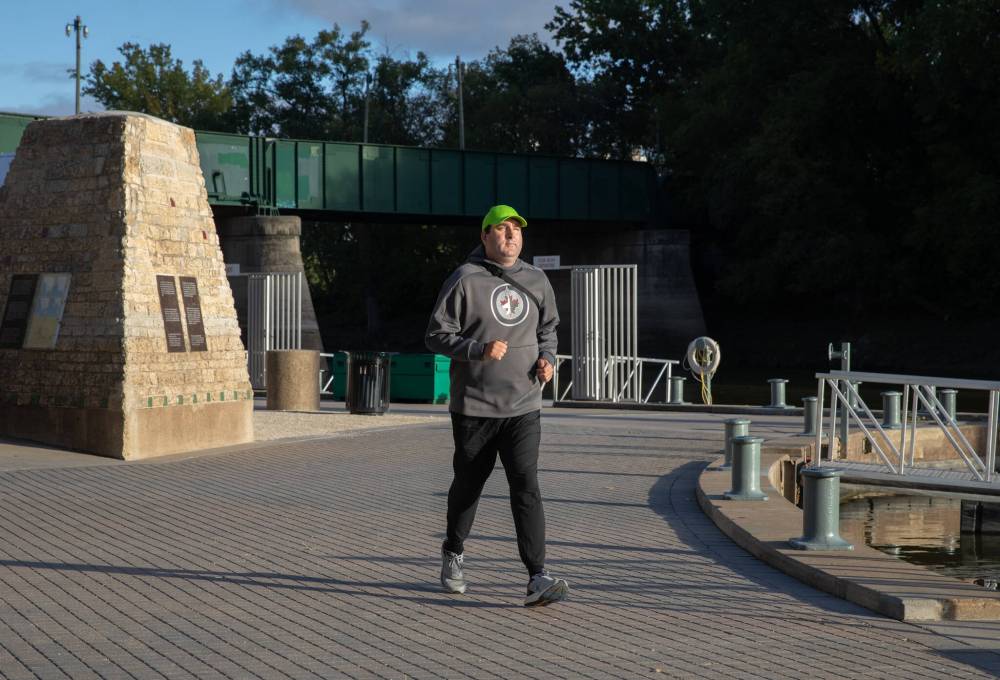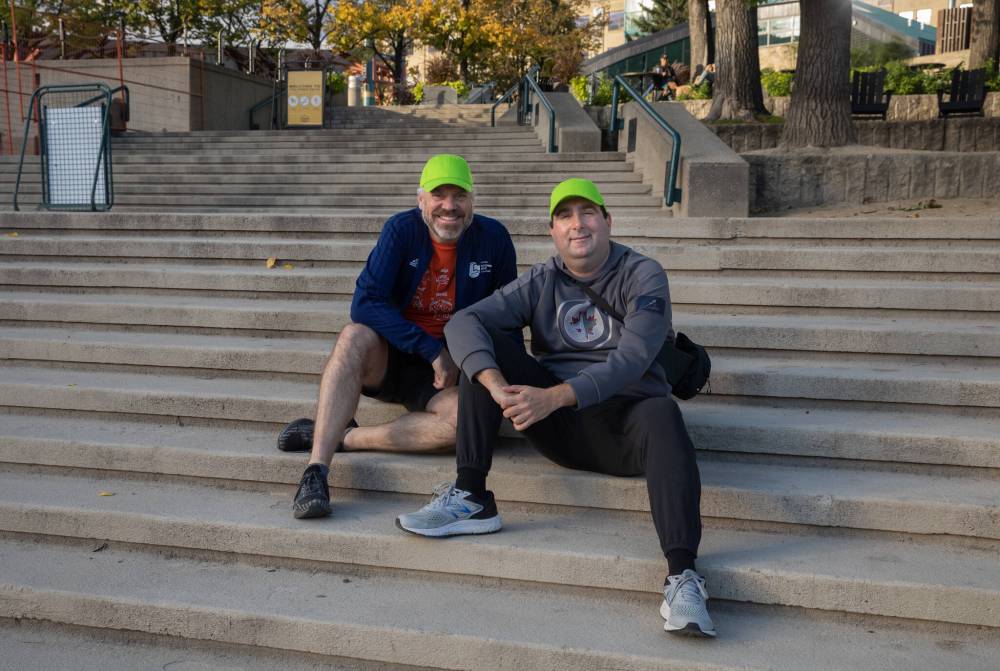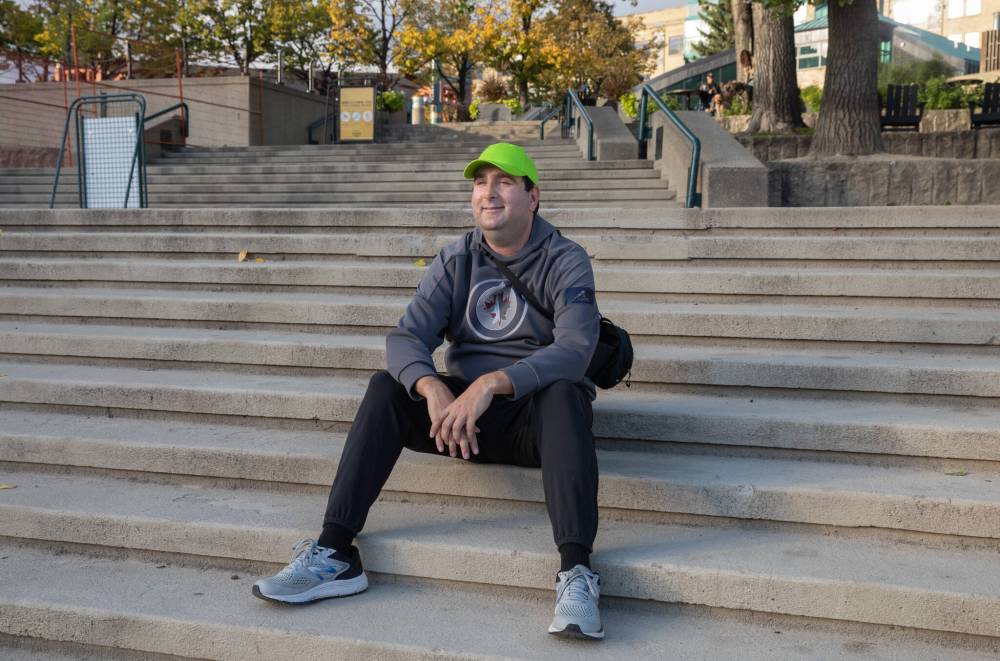Course connection
Lacing up running shoes after quarter-century lapse eased lockdown loneliness for Winnipegger
Advertisement
Read this article for free:
or
Already have an account? Log in here »
To continue reading, please subscribe:
Monthly Digital Subscription
$0 for the first 4 weeks*
- Enjoy unlimited reading on winnipegfreepress.com
- Read the E-Edition, our digital replica newspaper
- Access News Break, our award-winning app
- Play interactive puzzles
*No charge for 4 weeks then price increases to the regular rate of $19.00 plus GST every four weeks. Offer available to new and qualified returning subscribers only. Cancel any time.
Monthly Digital Subscription
$4.75/week*
- Enjoy unlimited reading on winnipegfreepress.com
- Read the E-Edition, our digital replica newspaper
- Access News Break, our award-winning app
- Play interactive puzzles
*Billed as $19 plus GST every four weeks. Cancel any time.
To continue reading, please subscribe:
Add Free Press access to your Brandon Sun subscription for only an additional
$1 for the first 4 weeks*
*Your next subscription payment will increase by $1.00 and you will be charged $16.99 plus GST for four weeks. After four weeks, your payment will increase to $23.99 plus GST every four weeks.
Read unlimited articles for free today:
or
Already have an account? Log in here »
Hey there, time traveller!
This article was published 26/09/2022 (1168 days ago), so information in it may no longer be current.
John Krestanowich took a more than quarter-century break from running but his return to the sport last year couldn’t have come at a better time.
“I hadn’t run much at all since junior high and it was very difficult for me to run when I was younger because I had pretty severe asthma,” he says.
In January 2021, Krestanowich, 44, joined a local running group that he had learned about in a newspaper article.

JESSICA LEE / WINNIPEG FREE PRESS
John Krestanowich joined a local running club two years ago on a whim last year.
“At that time, we didn’t know how bad the pandemic was going to get,” he says. “For me, I think that the biggest takeaway when I read the article was that I wanted to make a significant change in my life.”
At that time last year, COVID-19 was raging and we were all locked down. The running group Krestanowich read about was the Lindsay Somers Run Club.
“I reached out to Lindsay, saying that I really wanted to join the winter session (run club) because of all the awfulness that we were going through,” he says. “I signed up as soon as the email hit my inbox.”
Krestanowich lives on his own and didn’t see many people, owing to COVID-19 restrictions. He was looking for some human connection.
“We had been through terrible lockdowns and that made me want to (join) even more because I couldn’t see any of my friends. I live close to my parents, which is good,” he says. “But from September of 2020 until the summer of 2021, there are some people I just never saw, either because they just didn’t want to leave their house or they were petrified of COVID. So I was definitely looking for a new group of people but in a way that was safe.”
Many people experienced different forms of anxiety, depression and stress prior to the COVID-19 pandemic and the past two years have compounded those mental health impacts. Running (or any form of exercise) isn’t a cure-all, and sometimes therapy or medications are also required. But a 2020 review of 116 studies in the International Journal of Environmental Research and Public Health outlines strong evidence that running could be an effective way to help address many mental health challenges.
The run club meets twice each week — Wednesdays evenings and Sunday mornings. At first, Krestanowich says they could only run in groups of five because of health restrictions.
“We couldn’t meet or do anything socially after our runs, yet I’ve never had so much fun in my life,” he says.
Even though they couldn’t run together, the group was given neon neck warmers to help identify one another while outside. After Krestanowich completed his first run, he was overwhelmed with a sense of accomplishment.
“I was driving home and said to myself, ‘This is going to be life-changing,’” he says. “It could have been because we were locked in a box for so long and I was just happy to interact with other people.”
Once Krestanowich completed the winter run club, he was ready to go again. He signed up for the spring session and was able to run with a group for about a month until pandemic restrictions were put back in place.
“For that short period of time, I was very grateful that I could actually hang out and talk to people in small groups,” he says. “(The run club) gave me an excuse to get out and decompress and it gave me a chance to meet people.”
It wasn’t until the fall session of last year, when pandemic restrictions were slightly lifted, that Krestanowich was finally able to get to know and interact with other runners. He’d even begun running with some of them outside of the club.
Since then, Krestanowich’s confidence has skyrocketed. He’s completed five run clubs and is currently enrolled in his sixth.

JESSICA LEE / WINNIPEG FREE PRESS
John Krestanowich (right) lives on his own and didn’t see many people, owing to COVID-19 restrictions.
“I can count on one hand the number of runs I’ve missed and one of them was for baseball playoffs last year.”
Accountability is a key part of joining a group. These types of groups and clubs give members a reason to show up on those days when they may not feel like running.
“I looked forward to runs — they’re the highlights of my week. It’s almost like FOMO (fear of missing out) if I don’t go, because I don’t want to miss anything,” says Krestanowich.
Lindsay Somers Run Club is one of many run groups in the city. Other groups include the Running Room’s Run Club, the Winnipeg Run Club, BridgeForks Running and Winnipeg Frontrunners.
This past summer, Krestanowich also joined the Manitoba Runners’ Association (MRA) Track Club, which helped him to improve on his speed. The MRA, in association with Athletics Manitoba, has a running program specifically designed for road runners.
Joining a group was a game-changer for Krestanowich. In fact, he likely would have lost interest long ago had he tried running solo.
“Knowing that I’m going to be running with a group of people and that we’re going to socialize a bit afterwards, especially with what we’ve been through, is a massive motivator,” he says. “This has turned into my passion.”
No matter the level of runner you are, working together in a group is valuable for beginners and marathoners alike. You’ll likely form strong bonds with fellow runners and like-minded people.
A 2015 study published in the British Journal of Health Psychology shows that having workout buddies increases the amount of exercise people do, especially if their workout friends are encouraging and supportive.
This year, Krestanowich ran 50 kilometres on various bridges in Winnipeg as part of a program through City Park Runners called Run the Bridges. Participants were asked to run a designated number of loops along six bridges in the city at their own leisure. Upon the completion of each bridge, they were awarded a custom medal.
But his favourite accomplishment has been running in races. Earlier this summer, he completed his first 10-km race, the Run for Women at the Manitoba Legislative Building.
“I could have run five kilometres but I wanted to see if I could do 10 and break that barrier,” he says. “So I signed up and ran 10 kilometres in one hour and 13 minutes. That’s the fastest I’ve ever done.”
He also ran the 10-km race at this year’s Manitoba Marathon, withstanding the 37 C degree heat. His next goal? A half-marathon.
“I want to run in longer races. I know I can do it if I train and put my mind to it.”

JESSICA LEE / WINNIPEG FREE PRESS
John Krestanowich has completed five run clubs and is currently enrolled in his sixth.
Even though competing in a marathon wasn’t necessarily why Krestanowich started running, the races have been a pleasant surprise.
“I was just happy to get out in the fresh air and not be locked in a box with restrictions. That was the mental health piece. But then, as I started running more, I realized, ‘I can do this.’”
The run club has become more than accountability for Krestanowich — running has become part of his routine. People are creatures of habit, and routines offer a way to promote health and wellness through structure and organization.
“Before, I would get up on Sunday morning and just go get breakfast,” he says. “Typically, I get up at 7:45 in the morning when I get up for work. Now I’m doing that on a Sunday morning. It’s changed my entire lifestyle.”
Research has consistently shown that routines can play an important role in mental health. Having a routine can be helpful at any time, especially if you’re trying to establish healthy habits, but these routines can be particularly important when aspects of your life feel uncertain. A lack of structure and routine can actually exacerbate feelings of distress.
But even in the depths of COVID-19, Krestanowich found a bright light — friendship.
“This run group has done so much for me and the people are a big part of that. They are such good, positive, amazing human beings.”
For Krestanowich, the benefits of joining a run club have extended outside of run club hours.
“This has been an incredible journey, and it’s nowhere near being completed,” he says. “Next year (2023) is going to be the year of running. Even though I’m 44 years old, I feel like I’m just getting started.”
sabrinacarnevale@gmail.com
@SabrinaCsays

Sabrina Carnevale is a freelance writer and communications specialist, and former reporter and broadcaster who is a health enthusiast. She writes a twice-monthly column focusing on wellness and fitness.
Our newsroom depends on a growing audience of readers to power our journalism. If you are not a paid reader, please consider becoming a subscriber.
Our newsroom depends on its audience of readers to power our journalism. Thank you for your support.



